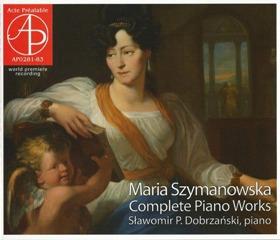Maria Szymanowska – Complete Piano Works (2013)
Maria Szymanowska – Complete Piano Works (2013)

CD 1: Six Menuet Le Murmure. Nocturne Danse Polonaise Twenty-Four Mazurkas or National Polish Dances Cotillon ou Valse figurée pour le piano Le Murmure. Nocturne à trois mains Quatre Valses à trois mains pur le pianoforte Nocturne in B flat major CD 2: Caprice sur la Romance de Joconde Grande Valse pour le pianoforte à quatre mains Serenade pour le Pianoforte avec accompagenment de violoncelle Dix-huit Dances de differents genres Fantaisie pour le pianoforte Romance de Monsieur le Prince Aleksander Galitzin CD 3: Vingt Exercices et Preludes Six Marches Divertissement pour le pianoforte avec accompagnement de violon Sławomir P. Dobrzański (piano) with Janka Krajciova, Eduardo Orozco, Thomas Alberici, Barry Chi Zhang and Virginia Houser (piano) Cheung Chau (cello) Blanka Bednarz (violin)
We can perhaps all be forgiven for not having heard of Maria Szymanowska, though if bells are being rung amongst readers of MWI then this is because her Ballades & Romances have been reviewed previously. By all accounts she is a fascinating character in the sometimes murky world in between the more easily identifiable stylistic aspects of those periods clearly labelled Classical and Romantic. She had no professional education in music other than from private tutors, but became a significant performer through tours in London, Germany, Russia, France, Italy and beyond. She was a friend of John Field and Goethe, and granted the title ‘First Court Pianist to the Imperial Princesses Elizabeth and Maria of Russia’ in 1822. Robert Schumann recognised her talent, if with somewhat faint praise: “If we detect the uncertain woman in form and harmony, we also find a woman full of feeling, who has much more to say, if she only knew how.”
Indeed, Szymanowska is no Schumann, though her piano pieces have on occasion something of a proto Chopin-esque quality to them. The Six Menuets which open this 3 CD set are filled with grace and charm, some with a slightly academic Etude quality to them, but with a few intriguing little harmonic twists, such as in the last of the set in D minor. Following established dance patterns as well as adopting newer trends such as the lyrical Nocturne genre, this catch-all description of ‘grace and charm’ is perhaps a little too general, but does encapsulate the impression left by most of the music here. Szymanowska’s sense of proportion and melodic gift is beyond question, and you can imagine any or all of these pieces bringing life to soirées anywhere in Europe during the early 19th century. The first of the Quatre Valses à trois mains towards the end of CD 1 has a cheeky quality which arguably evokes the spirit of Rossini, and the final track is the Nocturne in B flat major, the wide-ranging melody of which shows Szymanowska at her most expressive.
CD 2 opens with a piece dedicated to John Field, Caprice sur la Romance de Joconde, building on the variation techniques made fashionable by Hummel, who was also a friend of Szymanowska. This has quite a few flourishes one might have thought came from Chopin if struggling for references and is one of the most substantial individual pieces in the entire series. We are treated not only to works with piano solo with three or four hands in this set, but also such pieces as the Sérénade pour le Pianoforte avec le accompagnement de violoncelle. This occupies a different acoustic to the piano works and is a bit vaguely recorded, sounding a bit as if we are sitting behind the stage rather than having the music projected towards us. The work is a set of variations, the cello part intended for amateur use while the piano is given increasingly virtuoso material. Another notable work from CD 2 is the Fantaisie pour le pianoforte, which is full of operatic theatricality and drama and a refreshing change from large sets of dances.
CD 3 opens with the Vingt Exercises et Preludes, which stand as a testament to Szymanowska’s abilities as a pianist. These were known to Schumann, who remarked that “they are delicate azure wings that neither raise or depress the scales, and that no one should roughly touch.” They certainly prove challenging at times even for our soloist Mr. Dobrzanski, who does very well for the most part but does approach cracking point at times.
The Six Marches are also quite technically demanding and orchestral in their approach, and with quotes from Mozart and Russian folk tunes they also cast a wide cultural net. The set concludes with the rondo-form Divertissement pour le pianoforte avec accompagnement de violon, back in the Manhattan and Dickinson College acoustic and its shy microphone placement.
Altogether this is an excellent set of discoveries from the Acte Préalable label, and deserves nothing but plaudits. The piano used is listed as a Bösendorfer Imperial Grand, which has a suitably historical feel without being too far away from what you might consider a modern piano sound. It is in any case suitably in scale for the nature of these pieces. Slawomir P. Dobranski is good, but I can imagine some of these works being played with a little more élan and panache. The other pianists listed join him capably on the duet pieces, including his student the young Barry Zhang, aged 11. --- Dominy Clements , musicweb-international.com
download (mp3 @320 kbs):
uploaded yandex 4shared mega mediafire solidfiles zalivalka cloudmailru oboom








